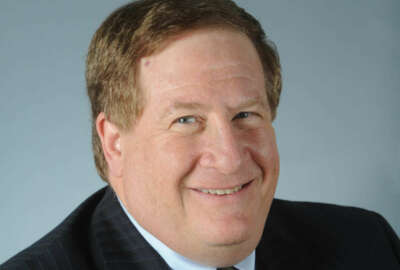

Hubbard Radio Washington DC, LLC. All rights reserved. This website is not intended for users located within the European Economic Area.
Federal contractors like companies throughout the economy must live under the regulatory regimes established by federal agencies. But what about the use of cont...
Best listening experience is on Chrome, Firefox or Safari. Subscribe to Federal Drive’s daily audio interviews on Apple Podcasts or PodcastOne.
Federal contractors like companies throughout the economy must live under the regulatory regimes established by federal agencies. But what about the use of contractors in the act of rulemaking itself? An activity you might have thought was inherently governmental. Not so fast. A study done for the Administrative Conference of the United States shows how much agencies do use contractors for this purpose. Federal Drive with Tom Temin got more from study co-author and University of Virginia professor, Dr. Rachel Augustine Potter.
Interview transcript:
Tom Temin: Dr. Potter, good to have you on.
Rachel Augustine Potter: Thanks for having me on, Tom.
Tom Temin: And what prompted you to study whether contractors are involved in the rulemaking process, which itself has a big administrative to-do, regardless of what it is they’re regulating?
Rachel Augustine Potter: Well, rulemaking is really special. When agencies write rules, they follow a process where they issue a proposed rule, generally, they get public comments, and then they write a final rule. And after that process, they have created binding law. So this is a really important fundamental activity that government agencies do today. And what we know sort of anecdotally, if you talk to agency personnel, they might say about writing a rule, they might tell you, “Oh, a contractor worked on that part of the rule.” Or you might look at a contractor’s website, and they might under their services tab say that they provide rulemaking support for agencies. And so what we wanted to do in this project, and this is a project with my co-author, Bridget Dooling at George Washington University, was to really unpack what that means. And whether this is something we should be really worried about, or okay with.
Tom Temin: Is the concern that the rule-making process might be influenced by the contractor point of view, or are contractors simply providing hosting services for the comments and that kind of thing?
Rachel Augustine Potter: Well, what we found in this report for ACUS , and I’m speaking on my personal behalf, not on ACUS’ behalf here. We found that contractors really perform all kinds of services. So we categorize those services in the report in great detail. But they do things that are more ministerial in nature, like what you’ve just described, maybe just downloading comments from regulations.gov, and organizing them for agencies, but they also do more substantive tasks depending on the agency. So they might do things like write a first draft of a proposed rule, both the preamble and the regulatory text.
Tom Temin: So they help with the English prose, in other words, as well as the technical aspects of hosting these things. It’s all done online nowadays, for the most part, any other things that contractors commonly do for agencies with respect to rulemaking?
Rachel Augustine Potter: So it really runs the gamut. Again, some agencies never use contractors in rulemaking, and other agencies, we found a real continuum. Where at the other end of the spectrum, some agencies are using contractors for all kinds of tasks, including maybe running surveys for the agency collecting data, reviewing the academic literature, perhaps analyzing comments that came in, right? So for helping the agency draft responses to those comments. It really is a panopoly of services, which is something that we weren’t expecting to find, we thought perhaps contractors were just helping with, comments, for example.
Tom Temin: And did you come across any examples where contractors actually influence or suggest the content of rules? For example, suppose we’re analyzing something in the environmental domain. And there’s a rule proposed for this many parts per million of something somewhere, do contractors ever say, well, a good rule might be 15 parts per million instead of 17?
Rachel Augustine Potter: So we didn’t come across any examples of contractors violating any sort of ethics rules, but one of the things we try to highlight in the report is that contractors and federal employees are really different animals. So federal employees swear an oath to the Constitution. And they are subject to a host of ethics requirements and other restrictions. Contractors don’t have those same restrictions, and they don’t swear that same oath. And so that raises a number of questions that I think we should be asking about what is happening when a contractor works on a rule and are there the appropriate safeguards in place?
Tom Temin: We’re speaking with Dr. Rachel Augustine Potter, an associate professor in the department of politics at the University of Virginia and co-author of the study for the Administrative Conference of the United States. What are some of the questions that arise, do you feel?
Rachel Augustine Potter: So the questions that agencies need to be asking themselves when it comes to if they’re using contractors in rulemaking are, what are the safeguards that we have in place? How do we set up an appropriate monitoring scheme within the agency? So one of the things we found in our report was the agency leaders don’t always know what’s happening with an agency rule. So they might sign off on the rule, but not know who worked on it within the agency, which isn’t uncommon. But at the same time, if contractors are helping agencies create that policy, then you might want to know the biases that they might be introducing and making sure that you’re cognizant of that as you move forward.
Tom Temin: Right? So it’s an accountability question, in many ways.
Rachel Augustine Potter: It’s an accountability and an ethics question, too. So we want to make sure contractors, again, since they don’t have those same loyalty and ethics requirements that federal employees do, we want to make sure that we’re protecting the agency’s interests.
Tom Temin: And just to put it bluntly, then there’s the possibility that a contractor working on a rule, it could be for another industry entirely than that contractor might be involved in. Nevertheless, they could be say, a little bit more pro-business than the agency wants to be, for example, I’m just making this up. But they could subtly alter the process such that the rule could be more favorable to industry than perhaps the agency originally intended.
Rachel Augustine Potter: So that’s the concern, that contractors might be introducing influence and that we want to make sure that we’re protecting the agency’s interest. Again, we didn’t find any concrete evidence of this. What we found is that there’s a potential for these organizational conflicts of interests where a firm could potentially learn things in a rulemaking and then use that information in ways that are advantageous to the firm later on. Where the individuals at a personal level might encounter personal conflicts of interests where they learn information in a rulemaking, and they don’t have the same restrictions that a federal employee who might learn that same information in a rulemaking might do.
Tom Temin: Right, they could make favorable investment decisions, for example.
Rachel Augustine Potter: Potentially, yes.
Tom Temin: And what about the question of inherently governmental? Because, I think, rulemaking everyone agrees is inherently governmental. This question came up in the A-76 debates of many years ago, do you feel that you saw any instances of where the inherently governmental part of rulemaking, where they got into the process deeply enough that it could be that contractors were doing inherently governmental work?
Rachel Augustine Potter: So when it comes to rulemaking, there’s a standard called “closely associated with inherently governmental function”. And many rulemaking support tasks are considered closely associated to inherently governmental. What we found in our report was that many agency personnel were aware that there was this line, one person said, a contractor can do everything except push that big red policymaking button, but that there probably needs to be greater awareness of exactly sort of where that line is, because it does get blurry.
Tom Temin: Right. Because if they do everything, but push the button, pushing the button is the closely associated, if it means like turning on a website or something or hitting the rule on final to publish a rule, which means that closely associated again, is the button pushing, but not all the process that led to what it is, that’s invoked by the button pushing?
Rachel Augustine Potter: Yeah, so that’s the kind of thing that we’re asking. How much of that is happening? Can we unpack how you get to a place where there’s at what one person described to us as a slippery slope? Where a contractor starts taking on more and more tasks to help the agency who’s understaffed and under-resourced? Who is making the policy decision? Again, our mandate was not to sort of go out and find examples of the bad guys, but really to help agencies explore and understand how they can structure the rulemaking process to avoid that slippery slope.
Tom Temin: Right. It could be almost like a caretaker for someone who is having dementia, if they start getting beyond these kinds of decisions. They have the right to make, I guess, on that person’s behalf. Did you have any recommendations for the Administrative Conference?
Rachel Augustine Potter: Yes, we had a number of recommendations in our report, some of them suggest that agencies should really step back and take stock, what are we doing in rulemaking? Who is doing what? What are our policies for contractors in rulemaking? Do we have a policy? If we don’t have a policy, we recommend the agencies go ahead and make a policy to say, Well, what meetings should contractors come to? What should they not come to? How are we guarding against both organizational and personal conflicts of interest in our agency, among many others, I should say.
Tom Temin: And these recommendations, what can happen with them? What can the Administrative Conference do with them. Can it adopt them as policy?
Rachel Augustine Potter: So we’re going through a process with the Administrative Conference right now to review our report, and there will be a public plenary in June. And after that, the conference will vote on whether to adopt recommendations related to this report. And if they do, agencies are encouraged to take them up.
Tom Temin: And they’re not having a contractor review the report for them, are they?
Rachel Augustine Potter: No. Although we are contractors for ACUS.
Tom Temin: Well, all right. It’s a complicated world sometimes. Rachel Augustine Potter is an associate professor in the department of politics at the University of Virginia, and co-author of the study for the Administrative Conference of the U.S. Thanks so much for joining me.
Rachel Augustine Potter: Thanks for having me, Tom.
Copyright © 2024 Federal News Network. All rights reserved. This website is not intended for users located within the European Economic Area.
Tom Temin is host of the Federal Drive and has been providing insight on federal technology and management issues for more than 30 years.
Follow @tteminWFED


